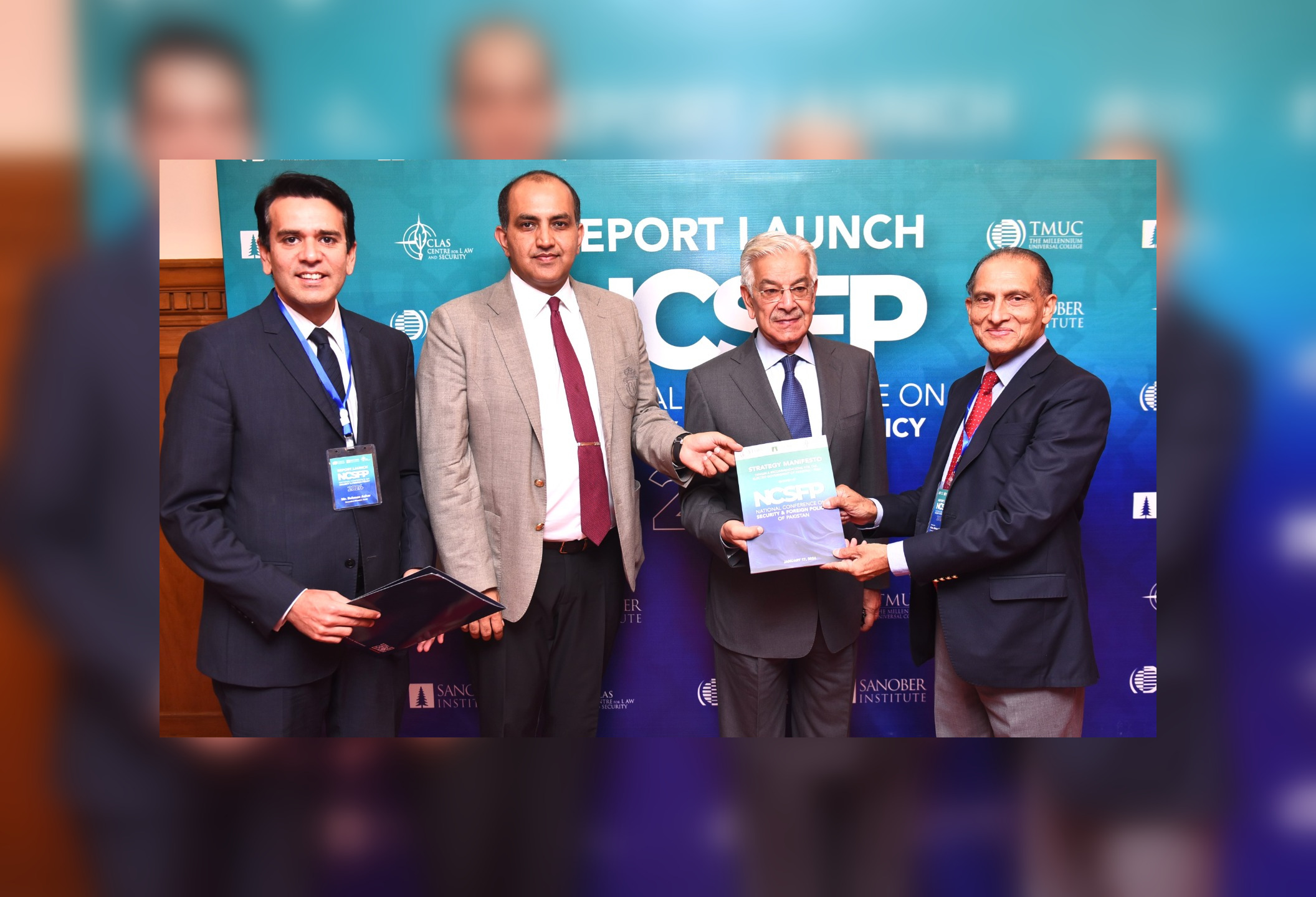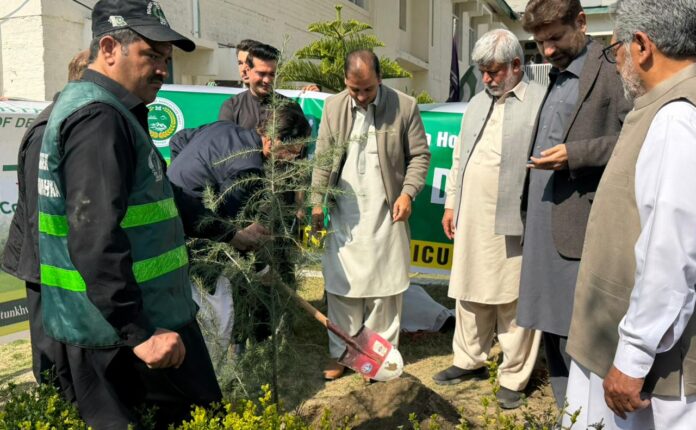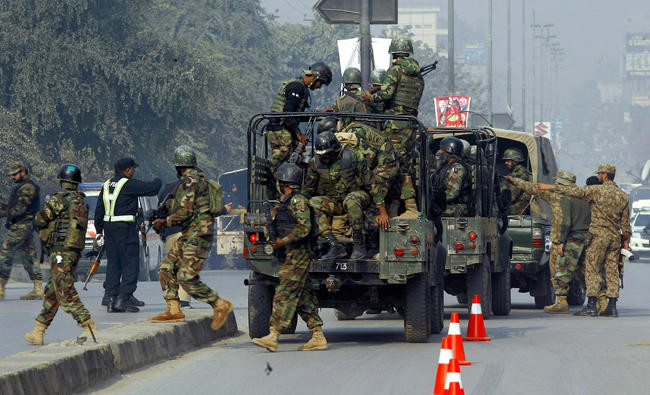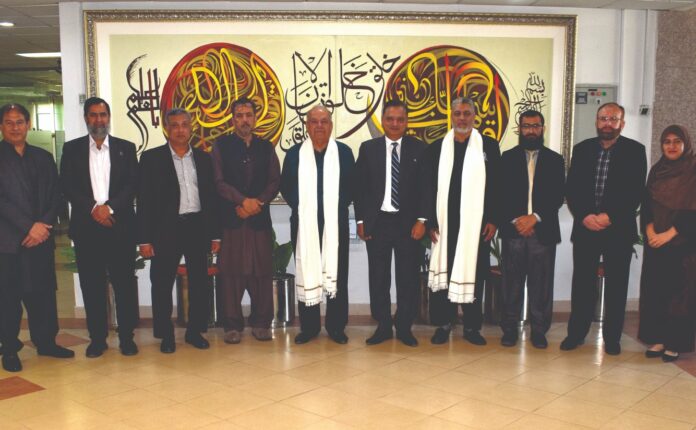Islamabad: A report on Pakistan’s security and foreign policy titled “Strategy Manifesto on Security and Foreign Policy” was launched at an event in a local hotel in Islamabad says a press release.
This report was prepared by the Centre for Law and Security CLAS, Sanober Institute (SI) and The Millennium Universal College TMUC after a National Conference where experts came together to formulate a set of 50 recommendations as a way forward for Pakistan’s security and foreign policy. A roundtable discussion was held at the launch event, attended by former diplomats and policy experts. Federal Minister for Defence Khawaja Muhammad Asif and Information Minister Ataullah Tarrar also attended the roundtable.
Federal Minister for Defence Khawaja Muhammad Asif delivered the opening note at the Roundtable as Chief Guest. He said that our relationship with China is still a bright spot in our foreign policy. He said that we made wrong choices in the past – most often these were the choices of the dictators for their personal interests. We ended up finding ourselves isolated afterwards. We have sided with everyone in Afghanistan and lost everyone as well. We have lost our foreign policy advantages in many places including the Gulf. We need to formulate a policy which is more relevant to our times and needs. He also said that there is interesting situation after elections in India. We will see how internal politics workout in India with the new setup there. He also said that our economic woes are compelling us to have difficult choices in the domain of foreign policy. We must focus on accommodating regional interests. He admitted that I have not seen foreign policy being discussed in Parliament in the longest time.
Information Minister Ataullah Tarrar was the Chief Guest at the concluding session. During his remarks, he said that we want a peaceful co-existence with India. Any talks between the two countries can take place only if they treat each other equally. Regarding government’s priorities in foreign visits, he said that we are clear that “government has no business of doing business”. He said we are not looking for aid but for investments and we have made it clear to our allies in recent visits. He also said that the Pakistan’s recent election at United Nations shows the growing confidence on Pakistan’s foreign policy. He said that Pakistan got record number of votes for this UNSC seat election. Pakistan’s relationship with Iran has also improved remarkably. “We have gained an ally in the region”.
Mr. Tarrar also said that Prime Minister’s recent visit to China was a successful feat in government’s diplomacy. Pakistan and China are now committed towards launching of phase two of the China Pakistan Economic Corridor (CPEC). He also mentioned that the country is finally headed towards economic stability. He said that media should also be an extended arm of government when it comes to foreign policy and feel passionate about promoting brand Pakistan in other countries.
The roundtable was attended by former ambassadors, policy experts and researchers from think tanks and academia. Among the panelists were former Foreign Secretary Ambassador Aizaz Chaudhry, CEO Roots Millennium Education Group Dr. Faisal Mushtaq, former Ambassador Naghmana Hashmi, Admiral (retired) Khan Hisham, Engineer Khalid Bashir and Dr Qamar Cheema. The discussion was moderated by Rehman Azhar, Executive Director for the Centre for Law and Security.
During his remarks Ambassador Aizaz Chaudhry highlighted the role of the private sector in bringing forth recommendations for foreign policy. He emphasized that Pakistan is ready for a balanced foreign policy and there should be transparency in its formulation. Policies formulated behind closed doors do not yield results.
Chairman Advisory Board CLAS, Dr. Faisal Mushtaq highlighted the need for educational institutions to come together and promote research in policy-making areas. He said that the expansion of the security domain into the economy and foreign policy requires wider input, especially from civil society.
Admiral (retired) Khan Hisham said foreign policy needs to be based on a principled stance. Its strategic direction must be very clear. We must take steps to implement policy decisions that can result in robust relationships with other countries.
Former Ambassador Naghmana Hashmi emphasized that Pakistan’s foreign policy choices were relevant to the need of the time. We need to straighten our economy to make bold and balanced foreign policy choices. Pakistan should be clear about its strategic relationship with China.
Dr Qamar Cheema remarked that we had not made pragmatic choices in the past. We need change to align our foreign policy with world interests.
Engineer Khalid Bashir said that economic interests should also be a driving force in our policy making. He emphasized that a lot can be done for overseas Pakistanis.
Panelists were presented souvenirs at the end of countable discussion. Rehman Azhar, Executive Director CLAS thanked the audience and speakers for their participation.







